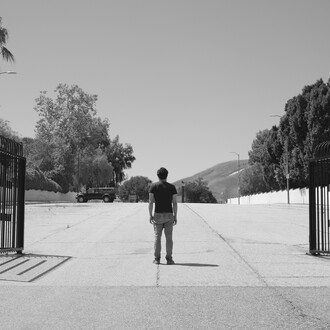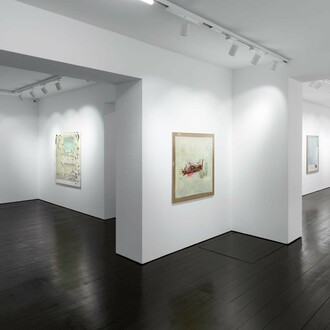In his first solo exhibition with ChertLüdde, Ali Eyal (b. 1994) presents a series of works centered around his family’s farm near Baghdad. Titled Let them say something, the exhibition serves as a fragmented testimonial reflecting on his childhood in Iraq amid the US military interventions of the 1990s and 2000s.
Eyal often begins with a first-person narrative that is repeatedly distorted and altered, with the farm serving as an enduring point of departure. In returning to this mythical place of origin, his experiences shift through terrains of memory and art. Across sculpture, drawing, and installation, the exhibition fragments personal history and reconfigures it into disjointed realities and semi-fictions.
One wall of the exhibition features a ceramic and mixed-media installation depicting the family’s horse lying lifeless on the farm, its abdomen swollen with gas. Eyal reimagines this site as an unlikely museum, inventing a narrative in which an anonymous curator discovers caterpillars devouring the museum’s artworks—including Eyal’s original drawing of the horse. Ceramic caterpillars crawl across the scene, interrupting the image. The story continues that, to protect the caterpillars, the curator cuts apart fragments of the original works, which Eyal then reassembles on a replica of the farm scene within the gallery.
Another wall of the gallery features a handwritten text in Arabic that recounts the story of the artist’s cousin, Hissam, who painted a large portrait of a warlord across the farm’s fields—hoping the massive portrait will protect his family by signaling their allegiance amid the ongoing military conflicts surrounding them. But before he finishes, word of his efforts spreads to armed men. He disappears, and all that remains of Hissam are his footprints, which erase the portraits of politicians and military leaders that Eyal has drawn and placed on pallets within the gallery.
In both retellings, the farm is reimagined as a site of creation and renewal, where Eyal’s figures and family members emerge as central artistic driving forces within a brutal narrative. As a way of confronting the violence he has witnessed, Eyal reshapes the image of the farm, infusing it with personal and symbolic significance rather than depicting it merely as a backdrop.
Currently, Ali Eyal’s paintings are being presented at the 18th Istanbul Biennale: The three-legged cat ( 20 September – 23 November 2025) and the Hammer Museum’s annual Made in LA Biennale (Oct 5, 2025 – Mar 1, 2026). In 2025, Eyal also took part in the 14th Mercosul Biennial.















